Starbucks Ethical Practices: A Literature Review on Consumer Behavior
VerifiedAdded on 2022/08/21
|9
|2274
|15
Literature Review
AI Summary
This literature review investigates the impact of Starbucks' ethical business practices on consumer behavior and purchasing decisions. It explores two key research questions: whether consumers prioritize ethical sourcing, and how consumer behavior influences the promotion and sourcing of ethical products. The review synthesizes scholarly articles from various sources, including journals and dissertations, to analyze consumer attitudes towards sustainable products, the influence of ethical practices on purchasing patterns, and the role of promotional strategies in conveying ethical values. The findings suggest a growing consumer interest in ethical sourcing, with a significant impact on sales and brand perception. The review also examines how Starbucks leverages ethical considerations in its promotional activities to align with consumer values and market trends. The conclusion highlights the importance of consumer behavior in shaping business strategies, particularly in the context of ethical practices.
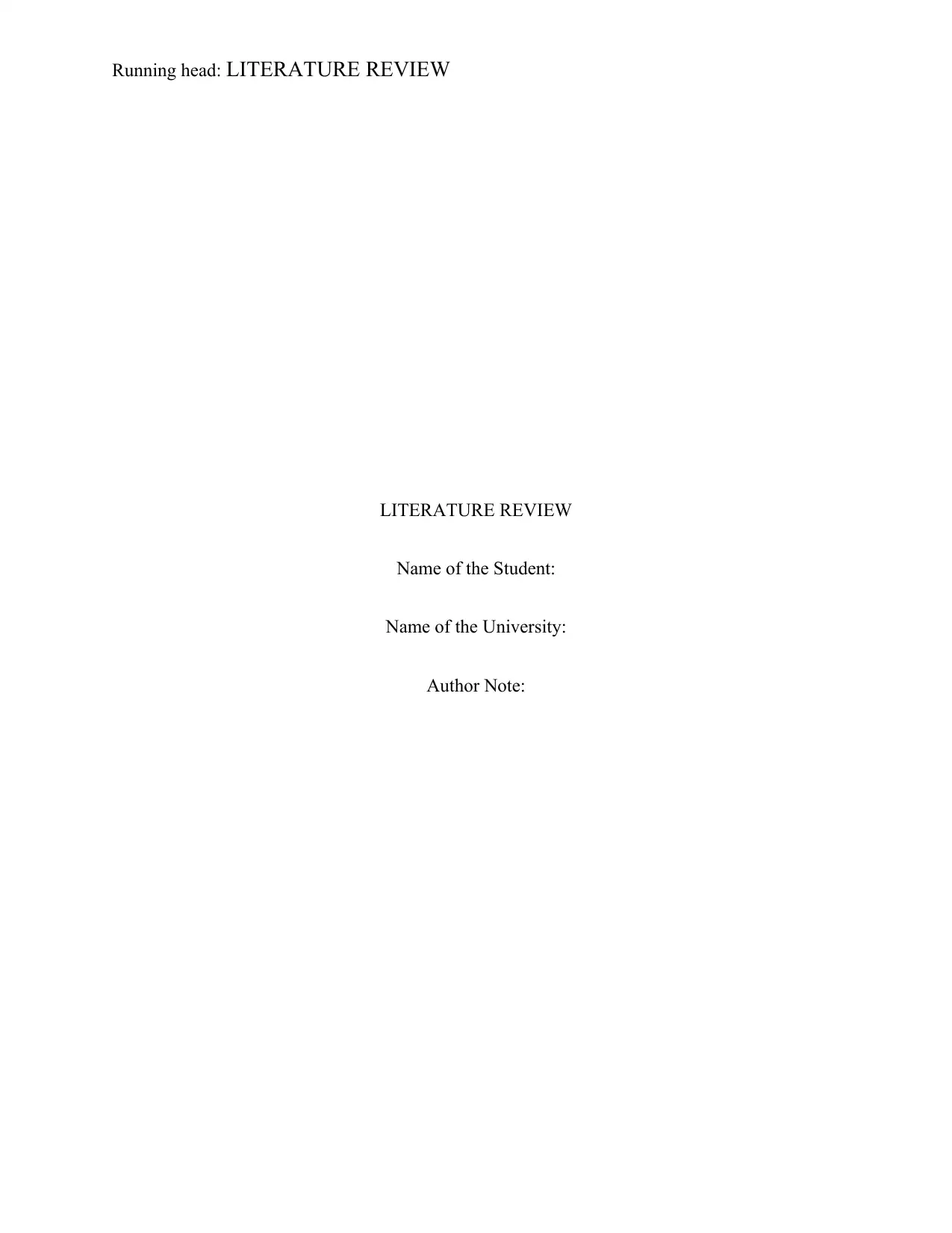
Running head: LITERATURE REVIEW
LITERATURE REVIEW
Name of the Student:
Name of the University:
Author Note:
LITERATURE REVIEW
Name of the Student:
Name of the University:
Author Note:
Paraphrase This Document
Need a fresh take? Get an instant paraphrase of this document with our AI Paraphraser
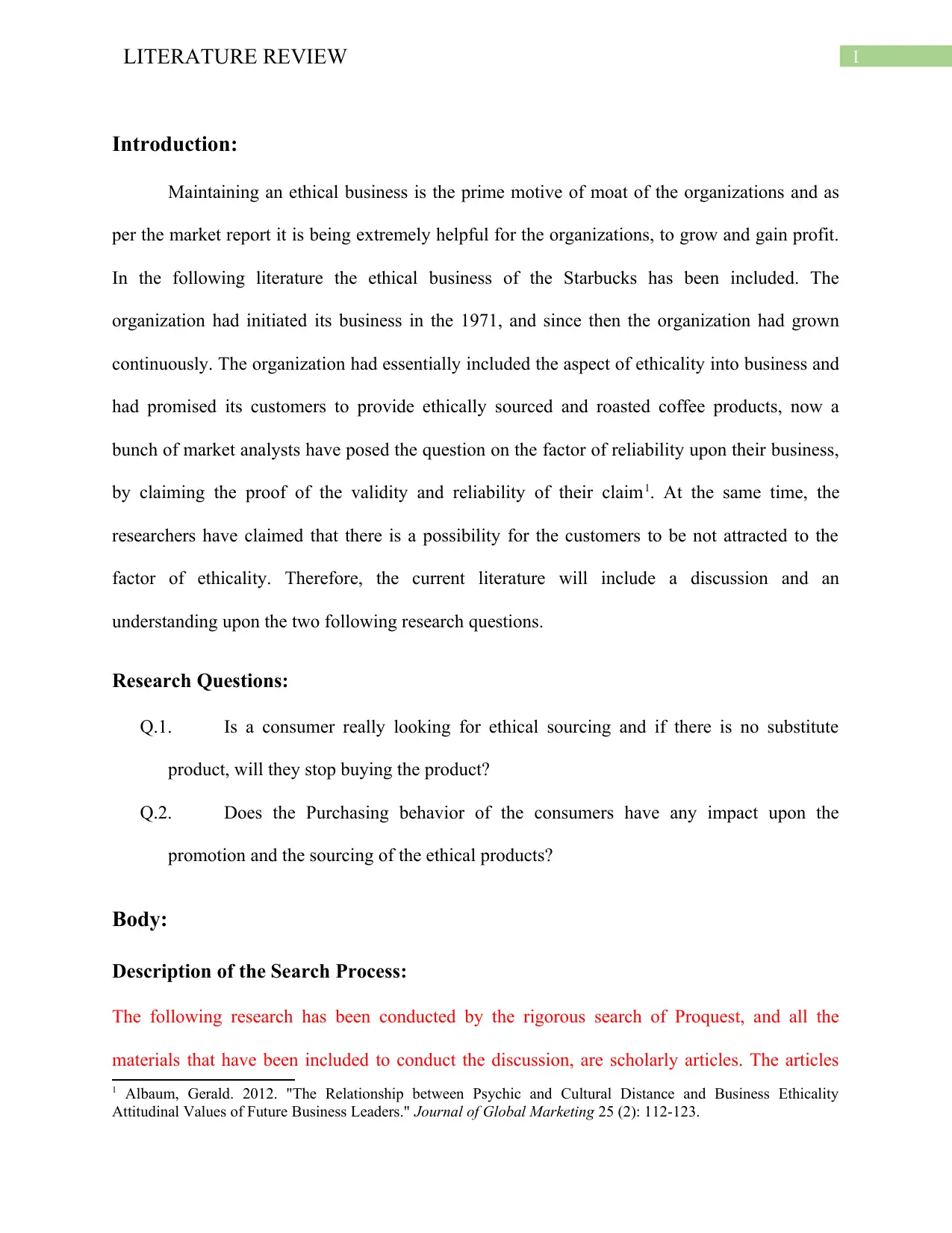
1LITERATURE REVIEW
Introduction:
Maintaining an ethical business is the prime motive of moat of the organizations and as
per the market report it is being extremely helpful for the organizations, to grow and gain profit.
In the following literature the ethical business of the Starbucks has been included. The
organization had initiated its business in the 1971, and since then the organization had grown
continuously. The organization had essentially included the aspect of ethicality into business and
had promised its customers to provide ethically sourced and roasted coffee products, now a
bunch of market analysts have posed the question on the factor of reliability upon their business,
by claiming the proof of the validity and reliability of their claim1. At the same time, the
researchers have claimed that there is a possibility for the customers to be not attracted to the
factor of ethicality. Therefore, the current literature will include a discussion and an
understanding upon the two following research questions.
Research Questions:
Q.1. Is a consumer really looking for ethical sourcing and if there is no substitute
product, will they stop buying the product?
Q.2. Does the Purchasing behavior of the consumers have any impact upon the
promotion and the sourcing of the ethical products?
Body:
Description of the Search Process:
The following research has been conducted by the rigorous search of Proquest, and all the
materials that have been included to conduct the discussion, are scholarly articles. The articles
1 Albaum, Gerald. 2012. "The Relationship between Psychic and Cultural Distance and Business Ethicality
Attitudinal Values of Future Business Leaders." Journal of Global Marketing 25 (2): 112-123.
Introduction:
Maintaining an ethical business is the prime motive of moat of the organizations and as
per the market report it is being extremely helpful for the organizations, to grow and gain profit.
In the following literature the ethical business of the Starbucks has been included. The
organization had initiated its business in the 1971, and since then the organization had grown
continuously. The organization had essentially included the aspect of ethicality into business and
had promised its customers to provide ethically sourced and roasted coffee products, now a
bunch of market analysts have posed the question on the factor of reliability upon their business,
by claiming the proof of the validity and reliability of their claim1. At the same time, the
researchers have claimed that there is a possibility for the customers to be not attracted to the
factor of ethicality. Therefore, the current literature will include a discussion and an
understanding upon the two following research questions.
Research Questions:
Q.1. Is a consumer really looking for ethical sourcing and if there is no substitute
product, will they stop buying the product?
Q.2. Does the Purchasing behavior of the consumers have any impact upon the
promotion and the sourcing of the ethical products?
Body:
Description of the Search Process:
The following research has been conducted by the rigorous search of Proquest, and all the
materials that have been included to conduct the discussion, are scholarly articles. The articles
1 Albaum, Gerald. 2012. "The Relationship between Psychic and Cultural Distance and Business Ethicality
Attitudinal Values of Future Business Leaders." Journal of Global Marketing 25 (2): 112-123.
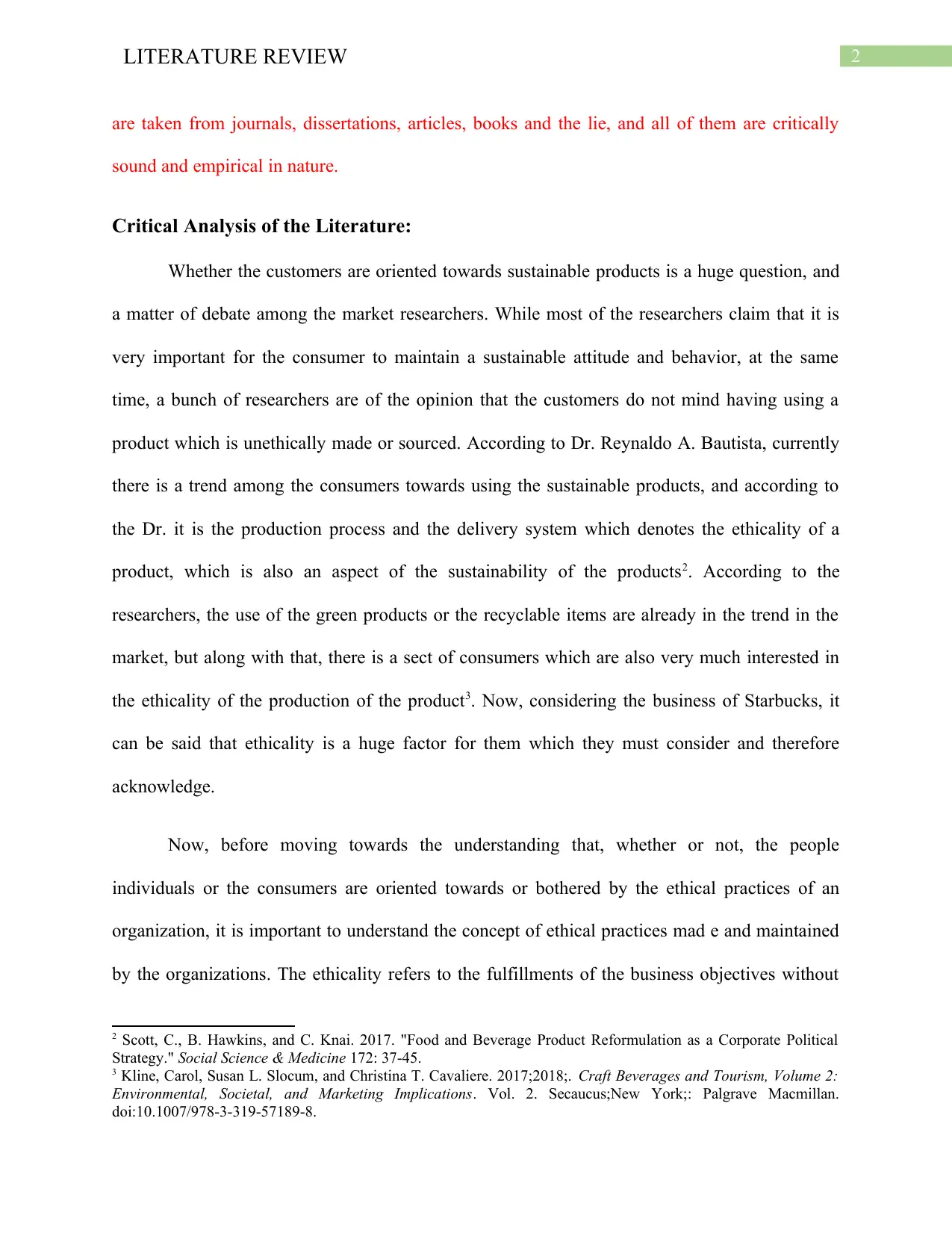
2LITERATURE REVIEW
are taken from journals, dissertations, articles, books and the lie, and all of them are critically
sound and empirical in nature.
Critical Analysis of the Literature:
Whether the customers are oriented towards sustainable products is a huge question, and
a matter of debate among the market researchers. While most of the researchers claim that it is
very important for the consumer to maintain a sustainable attitude and behavior, at the same
time, a bunch of researchers are of the opinion that the customers do not mind having using a
product which is unethically made or sourced. According to Dr. Reynaldo A. Bautista, currently
there is a trend among the consumers towards using the sustainable products, and according to
the Dr. it is the production process and the delivery system which denotes the ethicality of a
product, which is also an aspect of the sustainability of the products2. According to the
researchers, the use of the green products or the recyclable items are already in the trend in the
market, but along with that, there is a sect of consumers which are also very much interested in
the ethicality of the production of the product3. Now, considering the business of Starbucks, it
can be said that ethicality is a huge factor for them which they must consider and therefore
acknowledge.
Now, before moving towards the understanding that, whether or not, the people
individuals or the consumers are oriented towards or bothered by the ethical practices of an
organization, it is important to understand the concept of ethical practices mad e and maintained
by the organizations. The ethicality refers to the fulfillments of the business objectives without
2 Scott, C., B. Hawkins, and C. Knai. 2017. "Food and Beverage Product Reformulation as a Corporate Political
Strategy." Social Science & Medicine 172: 37-45.
3 Kline, Carol, Susan L. Slocum, and Christina T. Cavaliere. 2017;2018;. Craft Beverages and Tourism, Volume 2:
Environmental, Societal, and Marketing Implications. Vol. 2. Secaucus;New York;: Palgrave Macmillan.
doi:10.1007/978-3-319-57189-8.
are taken from journals, dissertations, articles, books and the lie, and all of them are critically
sound and empirical in nature.
Critical Analysis of the Literature:
Whether the customers are oriented towards sustainable products is a huge question, and
a matter of debate among the market researchers. While most of the researchers claim that it is
very important for the consumer to maintain a sustainable attitude and behavior, at the same
time, a bunch of researchers are of the opinion that the customers do not mind having using a
product which is unethically made or sourced. According to Dr. Reynaldo A. Bautista, currently
there is a trend among the consumers towards using the sustainable products, and according to
the Dr. it is the production process and the delivery system which denotes the ethicality of a
product, which is also an aspect of the sustainability of the products2. According to the
researchers, the use of the green products or the recyclable items are already in the trend in the
market, but along with that, there is a sect of consumers which are also very much interested in
the ethicality of the production of the product3. Now, considering the business of Starbucks, it
can be said that ethicality is a huge factor for them which they must consider and therefore
acknowledge.
Now, before moving towards the understanding that, whether or not, the people
individuals or the consumers are oriented towards or bothered by the ethical practices of an
organization, it is important to understand the concept of ethical practices mad e and maintained
by the organizations. The ethicality refers to the fulfillments of the business objectives without
2 Scott, C., B. Hawkins, and C. Knai. 2017. "Food and Beverage Product Reformulation as a Corporate Political
Strategy." Social Science & Medicine 172: 37-45.
3 Kline, Carol, Susan L. Slocum, and Christina T. Cavaliere. 2017;2018;. Craft Beverages and Tourism, Volume 2:
Environmental, Societal, and Marketing Implications. Vol. 2. Secaucus;New York;: Palgrave Macmillan.
doi:10.1007/978-3-319-57189-8.
⊘ This is a preview!⊘
Do you want full access?
Subscribe today to unlock all pages.

Trusted by 1+ million students worldwide
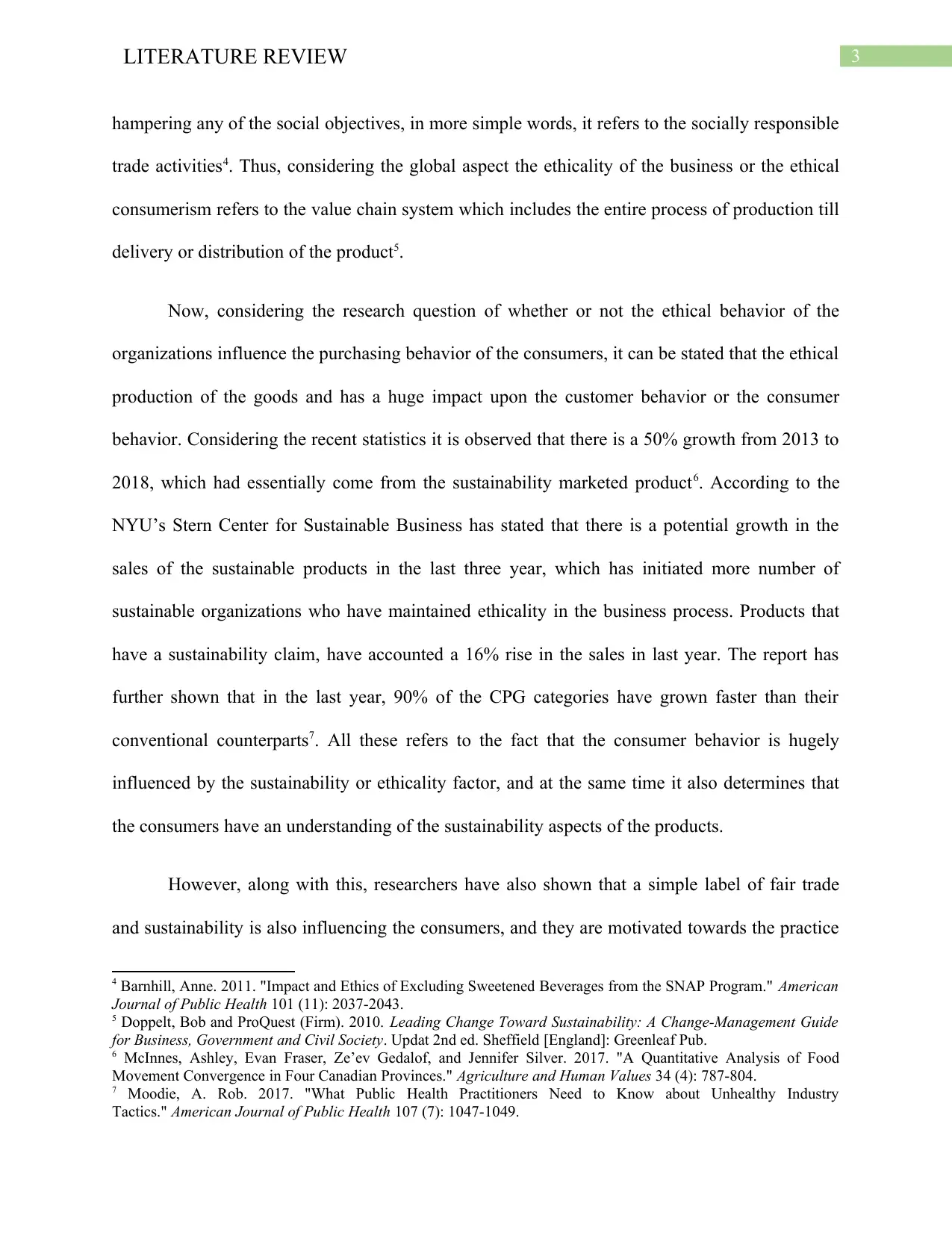
3LITERATURE REVIEW
hampering any of the social objectives, in more simple words, it refers to the socially responsible
trade activities4. Thus, considering the global aspect the ethicality of the business or the ethical
consumerism refers to the value chain system which includes the entire process of production till
delivery or distribution of the product5.
Now, considering the research question of whether or not the ethical behavior of the
organizations influence the purchasing behavior of the consumers, it can be stated that the ethical
production of the goods and has a huge impact upon the customer behavior or the consumer
behavior. Considering the recent statistics it is observed that there is a 50% growth from 2013 to
2018, which had essentially come from the sustainability marketed product6. According to the
NYU’s Stern Center for Sustainable Business has stated that there is a potential growth in the
sales of the sustainable products in the last three year, which has initiated more number of
sustainable organizations who have maintained ethicality in the business process. Products that
have a sustainability claim, have accounted a 16% rise in the sales in last year. The report has
further shown that in the last year, 90% of the CPG categories have grown faster than their
conventional counterparts7. All these refers to the fact that the consumer behavior is hugely
influenced by the sustainability or ethicality factor, and at the same time it also determines that
the consumers have an understanding of the sustainability aspects of the products.
However, along with this, researchers have also shown that a simple label of fair trade
and sustainability is also influencing the consumers, and they are motivated towards the practice
4 Barnhill, Anne. 2011. "Impact and Ethics of Excluding Sweetened Beverages from the SNAP Program." American
Journal of Public Health 101 (11): 2037-2043.
5 Doppelt, Bob and ProQuest (Firm). 2010. Leading Change Toward Sustainability: A Change-Management Guide
for Business, Government and Civil Society. Updat 2nd ed. Sheffield [England]: Greenleaf Pub.
6 McInnes, Ashley, Evan Fraser, Ze’ev Gedalof, and Jennifer Silver. 2017. "A Quantitative Analysis of Food
Movement Convergence in Four Canadian Provinces." Agriculture and Human Values 34 (4): 787-804.
7 Moodie, A. Rob. 2017. "What Public Health Practitioners Need to Know about Unhealthy Industry
Tactics." American Journal of Public Health 107 (7): 1047-1049.
hampering any of the social objectives, in more simple words, it refers to the socially responsible
trade activities4. Thus, considering the global aspect the ethicality of the business or the ethical
consumerism refers to the value chain system which includes the entire process of production till
delivery or distribution of the product5.
Now, considering the research question of whether or not the ethical behavior of the
organizations influence the purchasing behavior of the consumers, it can be stated that the ethical
production of the goods and has a huge impact upon the customer behavior or the consumer
behavior. Considering the recent statistics it is observed that there is a 50% growth from 2013 to
2018, which had essentially come from the sustainability marketed product6. According to the
NYU’s Stern Center for Sustainable Business has stated that there is a potential growth in the
sales of the sustainable products in the last three year, which has initiated more number of
sustainable organizations who have maintained ethicality in the business process. Products that
have a sustainability claim, have accounted a 16% rise in the sales in last year. The report has
further shown that in the last year, 90% of the CPG categories have grown faster than their
conventional counterparts7. All these refers to the fact that the consumer behavior is hugely
influenced by the sustainability or ethicality factor, and at the same time it also determines that
the consumers have an understanding of the sustainability aspects of the products.
However, along with this, researchers have also shown that a simple label of fair trade
and sustainability is also influencing the consumers, and they are motivated towards the practice
4 Barnhill, Anne. 2011. "Impact and Ethics of Excluding Sweetened Beverages from the SNAP Program." American
Journal of Public Health 101 (11): 2037-2043.
5 Doppelt, Bob and ProQuest (Firm). 2010. Leading Change Toward Sustainability: A Change-Management Guide
for Business, Government and Civil Society. Updat 2nd ed. Sheffield [England]: Greenleaf Pub.
6 McInnes, Ashley, Evan Fraser, Ze’ev Gedalof, and Jennifer Silver. 2017. "A Quantitative Analysis of Food
Movement Convergence in Four Canadian Provinces." Agriculture and Human Values 34 (4): 787-804.
7 Moodie, A. Rob. 2017. "What Public Health Practitioners Need to Know about Unhealthy Industry
Tactics." American Journal of Public Health 107 (7): 1047-1049.
Paraphrase This Document
Need a fresh take? Get an instant paraphrase of this document with our AI Paraphraser
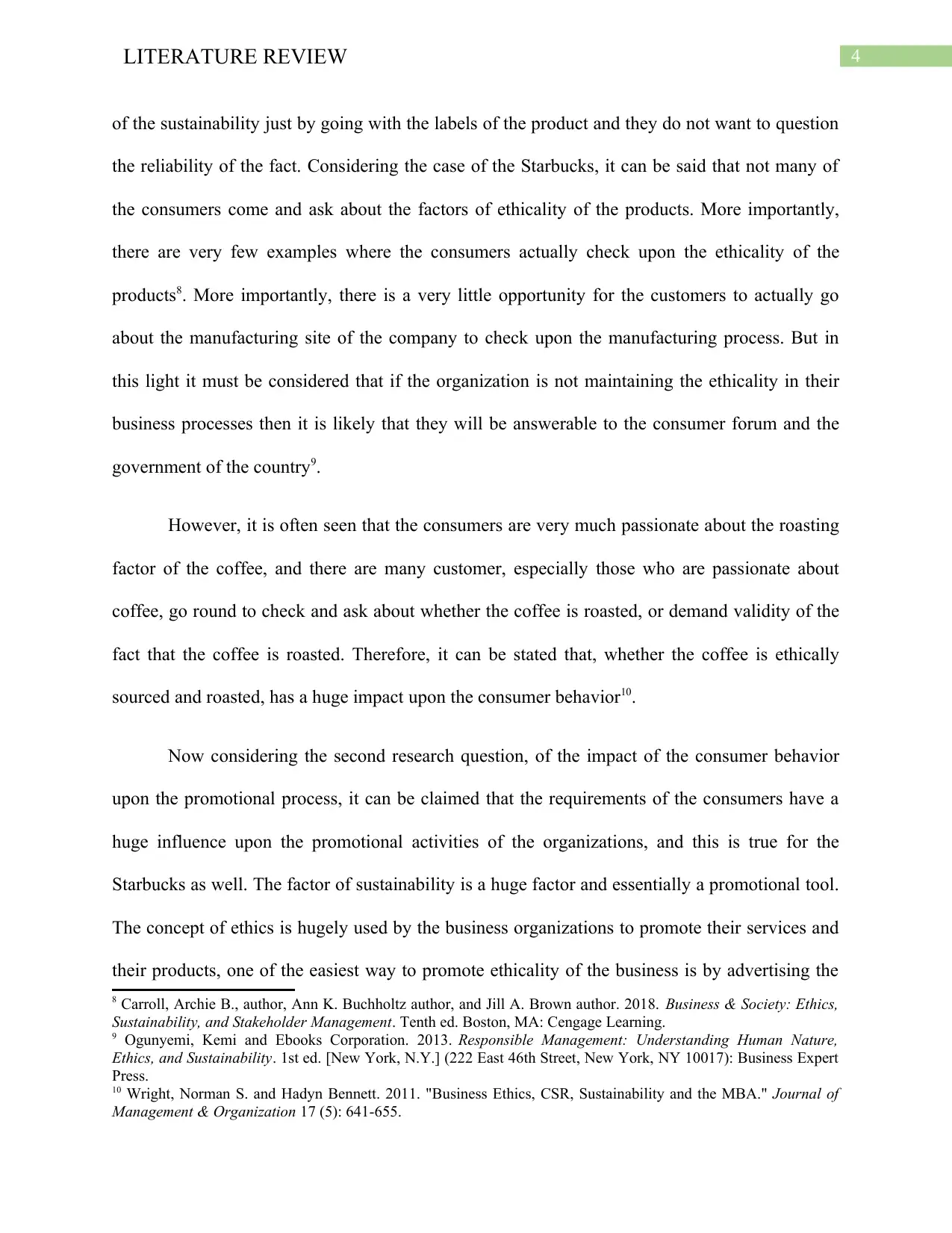
4LITERATURE REVIEW
of the sustainability just by going with the labels of the product and they do not want to question
the reliability of the fact. Considering the case of the Starbucks, it can be said that not many of
the consumers come and ask about the factors of ethicality of the products. More importantly,
there are very few examples where the consumers actually check upon the ethicality of the
products8. More importantly, there is a very little opportunity for the customers to actually go
about the manufacturing site of the company to check upon the manufacturing process. But in
this light it must be considered that if the organization is not maintaining the ethicality in their
business processes then it is likely that they will be answerable to the consumer forum and the
government of the country9.
However, it is often seen that the consumers are very much passionate about the roasting
factor of the coffee, and there are many customer, especially those who are passionate about
coffee, go round to check and ask about whether the coffee is roasted, or demand validity of the
fact that the coffee is roasted. Therefore, it can be stated that, whether the coffee is ethically
sourced and roasted, has a huge impact upon the consumer behavior10.
Now considering the second research question, of the impact of the consumer behavior
upon the promotional process, it can be claimed that the requirements of the consumers have a
huge influence upon the promotional activities of the organizations, and this is true for the
Starbucks as well. The factor of sustainability is a huge factor and essentially a promotional tool.
The concept of ethics is hugely used by the business organizations to promote their services and
their products, one of the easiest way to promote ethicality of the business is by advertising the
8 Carroll, Archie B., author, Ann K. Buchholtz author, and Jill A. Brown author. 2018. Business & Society: Ethics,
Sustainability, and Stakeholder Management. Tenth ed. Boston, MA: Cengage Learning.
9 Ogunyemi, Kemi and Ebooks Corporation. 2013. Responsible Management: Understanding Human Nature,
Ethics, and Sustainability. 1st ed. [New York, N.Y.] (222 East 46th Street, New York, NY 10017): Business Expert
Press.
10 Wright, Norman S. and Hadyn Bennett. 2011. "Business Ethics, CSR, Sustainability and the MBA." Journal of
Management & Organization 17 (5): 641-655.
of the sustainability just by going with the labels of the product and they do not want to question
the reliability of the fact. Considering the case of the Starbucks, it can be said that not many of
the consumers come and ask about the factors of ethicality of the products. More importantly,
there are very few examples where the consumers actually check upon the ethicality of the
products8. More importantly, there is a very little opportunity for the customers to actually go
about the manufacturing site of the company to check upon the manufacturing process. But in
this light it must be considered that if the organization is not maintaining the ethicality in their
business processes then it is likely that they will be answerable to the consumer forum and the
government of the country9.
However, it is often seen that the consumers are very much passionate about the roasting
factor of the coffee, and there are many customer, especially those who are passionate about
coffee, go round to check and ask about whether the coffee is roasted, or demand validity of the
fact that the coffee is roasted. Therefore, it can be stated that, whether the coffee is ethically
sourced and roasted, has a huge impact upon the consumer behavior10.
Now considering the second research question, of the impact of the consumer behavior
upon the promotional process, it can be claimed that the requirements of the consumers have a
huge influence upon the promotional activities of the organizations, and this is true for the
Starbucks as well. The factor of sustainability is a huge factor and essentially a promotional tool.
The concept of ethics is hugely used by the business organizations to promote their services and
their products, one of the easiest way to promote ethicality of the business is by advertising the
8 Carroll, Archie B., author, Ann K. Buchholtz author, and Jill A. Brown author. 2018. Business & Society: Ethics,
Sustainability, and Stakeholder Management. Tenth ed. Boston, MA: Cengage Learning.
9 Ogunyemi, Kemi and Ebooks Corporation. 2013. Responsible Management: Understanding Human Nature,
Ethics, and Sustainability. 1st ed. [New York, N.Y.] (222 East 46th Street, New York, NY 10017): Business Expert
Press.
10 Wright, Norman S. and Hadyn Bennett. 2011. "Business Ethics, CSR, Sustainability and the MBA." Journal of
Management & Organization 17 (5): 641-655.
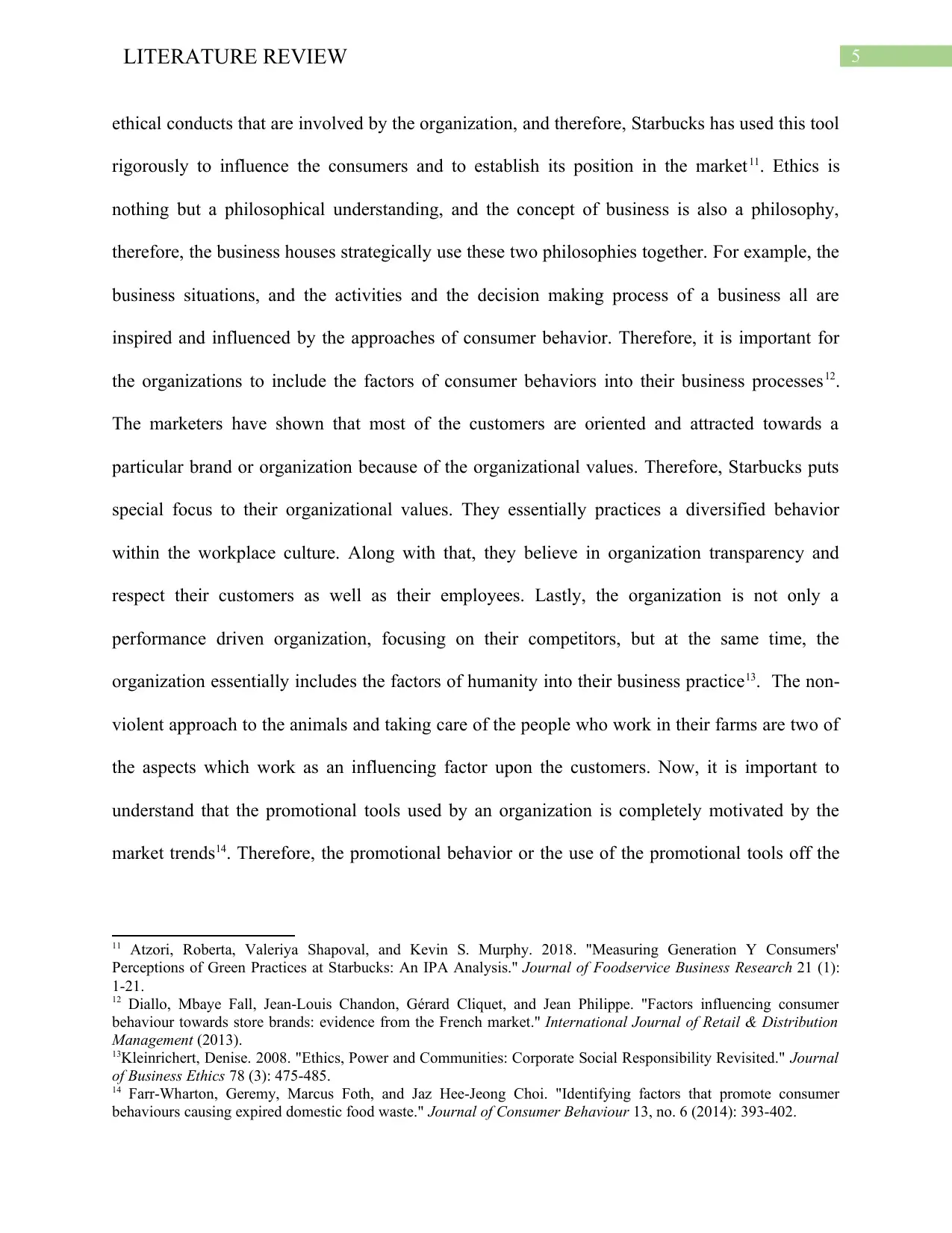
5LITERATURE REVIEW
ethical conducts that are involved by the organization, and therefore, Starbucks has used this tool
rigorously to influence the consumers and to establish its position in the market11. Ethics is
nothing but a philosophical understanding, and the concept of business is also a philosophy,
therefore, the business houses strategically use these two philosophies together. For example, the
business situations, and the activities and the decision making process of a business all are
inspired and influenced by the approaches of consumer behavior. Therefore, it is important for
the organizations to include the factors of consumer behaviors into their business processes12.
The marketers have shown that most of the customers are oriented and attracted towards a
particular brand or organization because of the organizational values. Therefore, Starbucks puts
special focus to their organizational values. They essentially practices a diversified behavior
within the workplace culture. Along with that, they believe in organization transparency and
respect their customers as well as their employees. Lastly, the organization is not only a
performance driven organization, focusing on their competitors, but at the same time, the
organization essentially includes the factors of humanity into their business practice13. The non-
violent approach to the animals and taking care of the people who work in their farms are two of
the aspects which work as an influencing factor upon the customers. Now, it is important to
understand that the promotional tools used by an organization is completely motivated by the
market trends14. Therefore, the promotional behavior or the use of the promotional tools off the
11 Atzori, Roberta, Valeriya Shapoval, and Kevin S. Murphy. 2018. "Measuring Generation Y Consumers'
Perceptions of Green Practices at Starbucks: An IPA Analysis." Journal of Foodservice Business Research 21 (1):
1-21.
12 Diallo, Mbaye Fall, Jean‐Louis Chandon, Gérard Cliquet, and Jean Philippe. "Factors influencing consumer
behaviour towards store brands: evidence from the French market." International Journal of Retail & Distribution
Management (2013).
13Kleinrichert, Denise. 2008. "Ethics, Power and Communities: Corporate Social Responsibility Revisited." Journal
of Business Ethics 78 (3): 475-485.
14 Farr‐Wharton, Geremy, Marcus Foth, and Jaz Hee‐Jeong Choi. "Identifying factors that promote consumer
behaviours causing expired domestic food waste." Journal of Consumer Behaviour 13, no. 6 (2014): 393-402.
ethical conducts that are involved by the organization, and therefore, Starbucks has used this tool
rigorously to influence the consumers and to establish its position in the market11. Ethics is
nothing but a philosophical understanding, and the concept of business is also a philosophy,
therefore, the business houses strategically use these two philosophies together. For example, the
business situations, and the activities and the decision making process of a business all are
inspired and influenced by the approaches of consumer behavior. Therefore, it is important for
the organizations to include the factors of consumer behaviors into their business processes12.
The marketers have shown that most of the customers are oriented and attracted towards a
particular brand or organization because of the organizational values. Therefore, Starbucks puts
special focus to their organizational values. They essentially practices a diversified behavior
within the workplace culture. Along with that, they believe in organization transparency and
respect their customers as well as their employees. Lastly, the organization is not only a
performance driven organization, focusing on their competitors, but at the same time, the
organization essentially includes the factors of humanity into their business practice13. The non-
violent approach to the animals and taking care of the people who work in their farms are two of
the aspects which work as an influencing factor upon the customers. Now, it is important to
understand that the promotional tools used by an organization is completely motivated by the
market trends14. Therefore, the promotional behavior or the use of the promotional tools off the
11 Atzori, Roberta, Valeriya Shapoval, and Kevin S. Murphy. 2018. "Measuring Generation Y Consumers'
Perceptions of Green Practices at Starbucks: An IPA Analysis." Journal of Foodservice Business Research 21 (1):
1-21.
12 Diallo, Mbaye Fall, Jean‐Louis Chandon, Gérard Cliquet, and Jean Philippe. "Factors influencing consumer
behaviour towards store brands: evidence from the French market." International Journal of Retail & Distribution
Management (2013).
13Kleinrichert, Denise. 2008. "Ethics, Power and Communities: Corporate Social Responsibility Revisited." Journal
of Business Ethics 78 (3): 475-485.
14 Farr‐Wharton, Geremy, Marcus Foth, and Jaz Hee‐Jeong Choi. "Identifying factors that promote consumer
behaviours causing expired domestic food waste." Journal of Consumer Behaviour 13, no. 6 (2014): 393-402.
⊘ This is a preview!⊘
Do you want full access?
Subscribe today to unlock all pages.

Trusted by 1+ million students worldwide
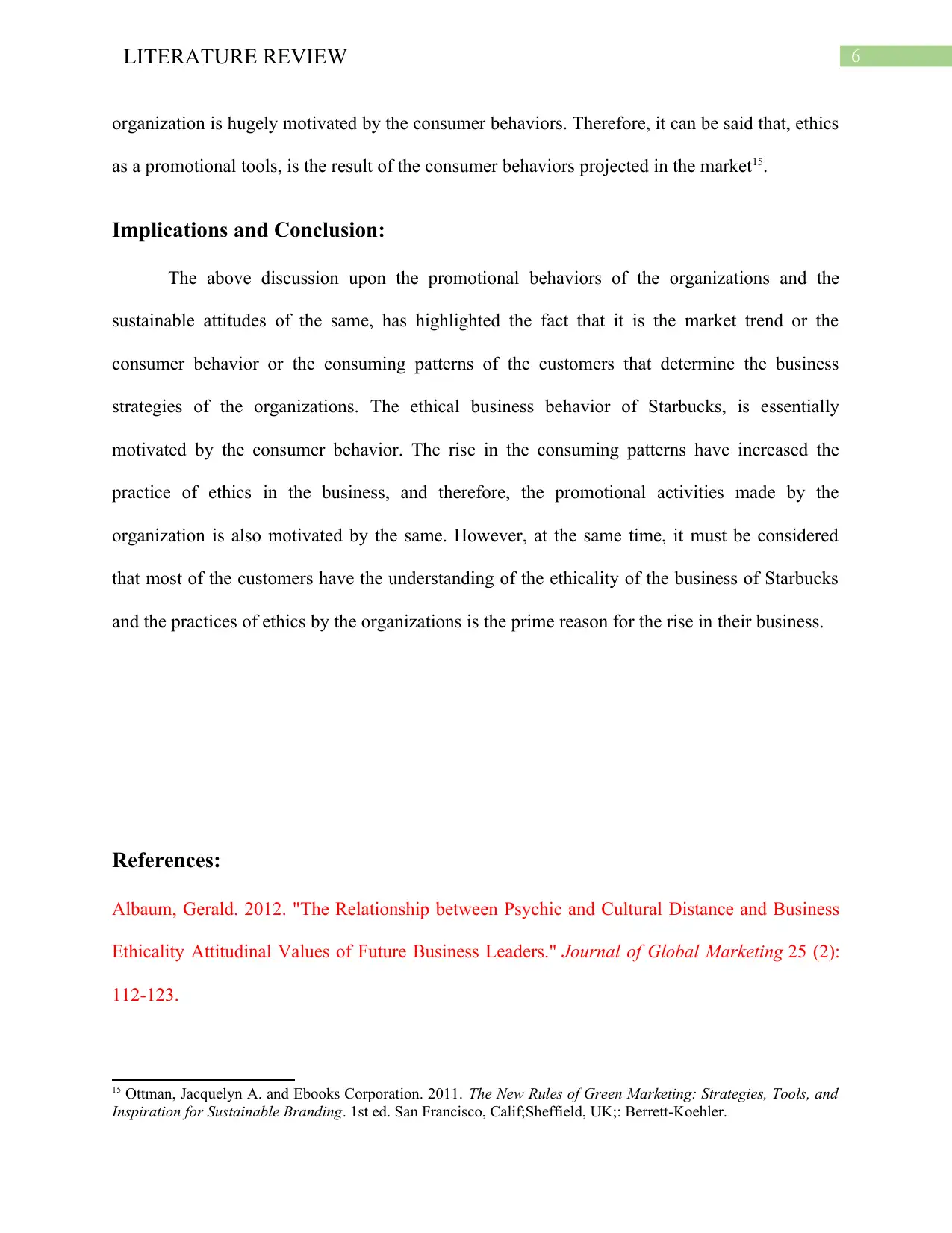
6LITERATURE REVIEW
organization is hugely motivated by the consumer behaviors. Therefore, it can be said that, ethics
as a promotional tools, is the result of the consumer behaviors projected in the market15.
Implications and Conclusion:
The above discussion upon the promotional behaviors of the organizations and the
sustainable attitudes of the same, has highlighted the fact that it is the market trend or the
consumer behavior or the consuming patterns of the customers that determine the business
strategies of the organizations. The ethical business behavior of Starbucks, is essentially
motivated by the consumer behavior. The rise in the consuming patterns have increased the
practice of ethics in the business, and therefore, the promotional activities made by the
organization is also motivated by the same. However, at the same time, it must be considered
that most of the customers have the understanding of the ethicality of the business of Starbucks
and the practices of ethics by the organizations is the prime reason for the rise in their business.
References:
Albaum, Gerald. 2012. "The Relationship between Psychic and Cultural Distance and Business
Ethicality Attitudinal Values of Future Business Leaders." Journal of Global Marketing 25 (2):
112-123.
15 Ottman, Jacquelyn A. and Ebooks Corporation. 2011. The New Rules of Green Marketing: Strategies, Tools, and
Inspiration for Sustainable Branding. 1st ed. San Francisco, Calif;Sheffield, UK;: Berrett-Koehler.
organization is hugely motivated by the consumer behaviors. Therefore, it can be said that, ethics
as a promotional tools, is the result of the consumer behaviors projected in the market15.
Implications and Conclusion:
The above discussion upon the promotional behaviors of the organizations and the
sustainable attitudes of the same, has highlighted the fact that it is the market trend or the
consumer behavior or the consuming patterns of the customers that determine the business
strategies of the organizations. The ethical business behavior of Starbucks, is essentially
motivated by the consumer behavior. The rise in the consuming patterns have increased the
practice of ethics in the business, and therefore, the promotional activities made by the
organization is also motivated by the same. However, at the same time, it must be considered
that most of the customers have the understanding of the ethicality of the business of Starbucks
and the practices of ethics by the organizations is the prime reason for the rise in their business.
References:
Albaum, Gerald. 2012. "The Relationship between Psychic and Cultural Distance and Business
Ethicality Attitudinal Values of Future Business Leaders." Journal of Global Marketing 25 (2):
112-123.
15 Ottman, Jacquelyn A. and Ebooks Corporation. 2011. The New Rules of Green Marketing: Strategies, Tools, and
Inspiration for Sustainable Branding. 1st ed. San Francisco, Calif;Sheffield, UK;: Berrett-Koehler.
Paraphrase This Document
Need a fresh take? Get an instant paraphrase of this document with our AI Paraphraser
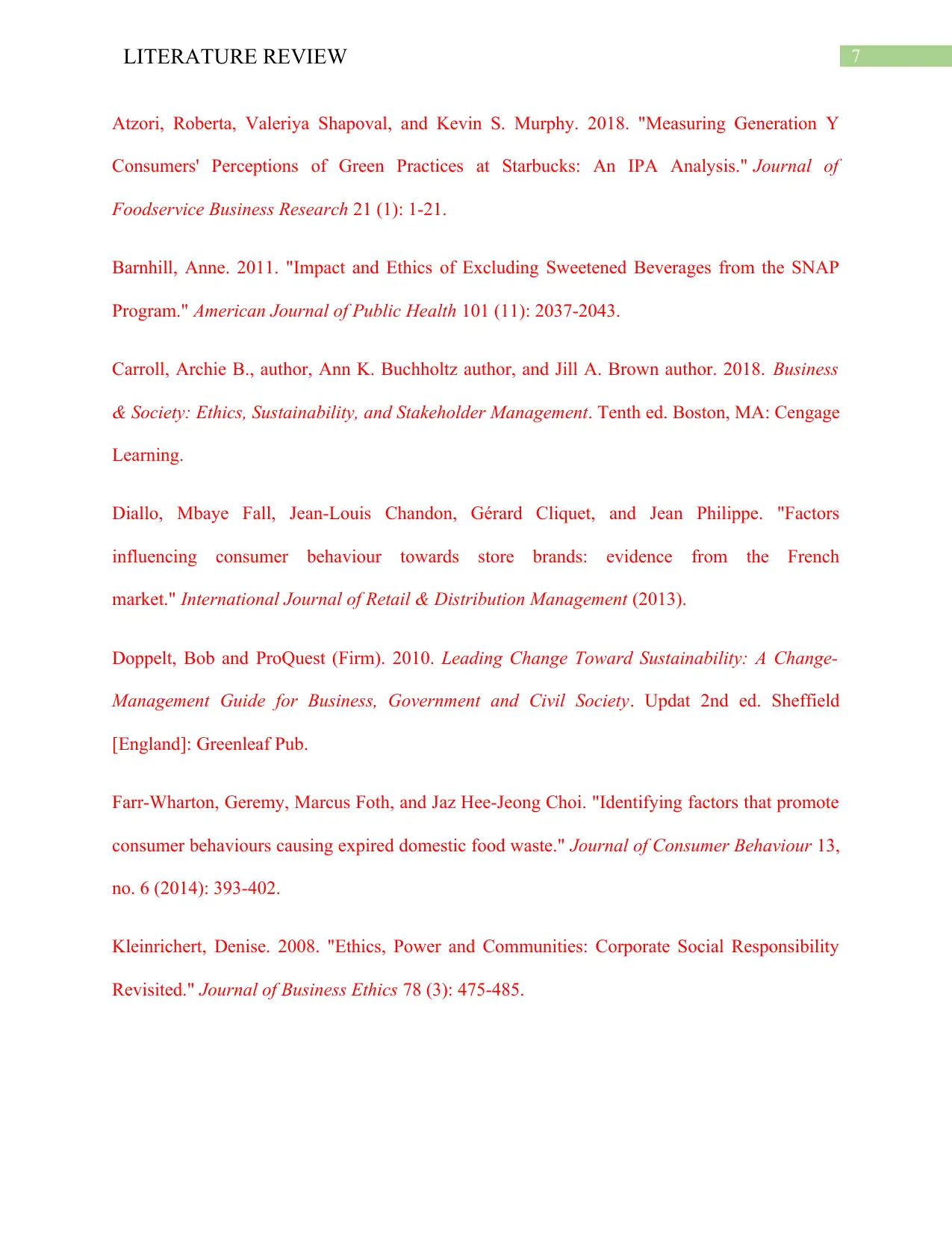
7LITERATURE REVIEW
Atzori, Roberta, Valeriya Shapoval, and Kevin S. Murphy. 2018. "Measuring Generation Y
Consumers' Perceptions of Green Practices at Starbucks: An IPA Analysis." Journal of
Foodservice Business Research 21 (1): 1-21.
Barnhill, Anne. 2011. "Impact and Ethics of Excluding Sweetened Beverages from the SNAP
Program." American Journal of Public Health 101 (11): 2037-2043.
Carroll, Archie B., author, Ann K. Buchholtz author, and Jill A. Brown author. 2018. Business
& Society: Ethics, Sustainability, and Stakeholder Management. Tenth ed. Boston, MA: Cengage
Learning.
Diallo, Mbaye Fall, Jean‐Louis Chandon, Gérard Cliquet, and Jean Philippe. "Factors
influencing consumer behaviour towards store brands: evidence from the French
market." International Journal of Retail & Distribution Management (2013).
Doppelt, Bob and ProQuest (Firm). 2010. Leading Change Toward Sustainability: A Change-
Management Guide for Business, Government and Civil Society. Updat 2nd ed. Sheffield
[England]: Greenleaf Pub.
Farr‐Wharton, Geremy, Marcus Foth, and Jaz Hee‐Jeong Choi. "Identifying factors that promote
consumer behaviours causing expired domestic food waste." Journal of Consumer Behaviour 13,
no. 6 (2014): 393-402.
Kleinrichert, Denise. 2008. "Ethics, Power and Communities: Corporate Social Responsibility
Revisited." Journal of Business Ethics 78 (3): 475-485.
Atzori, Roberta, Valeriya Shapoval, and Kevin S. Murphy. 2018. "Measuring Generation Y
Consumers' Perceptions of Green Practices at Starbucks: An IPA Analysis." Journal of
Foodservice Business Research 21 (1): 1-21.
Barnhill, Anne. 2011. "Impact and Ethics of Excluding Sweetened Beverages from the SNAP
Program." American Journal of Public Health 101 (11): 2037-2043.
Carroll, Archie B., author, Ann K. Buchholtz author, and Jill A. Brown author. 2018. Business
& Society: Ethics, Sustainability, and Stakeholder Management. Tenth ed. Boston, MA: Cengage
Learning.
Diallo, Mbaye Fall, Jean‐Louis Chandon, Gérard Cliquet, and Jean Philippe. "Factors
influencing consumer behaviour towards store brands: evidence from the French
market." International Journal of Retail & Distribution Management (2013).
Doppelt, Bob and ProQuest (Firm). 2010. Leading Change Toward Sustainability: A Change-
Management Guide for Business, Government and Civil Society. Updat 2nd ed. Sheffield
[England]: Greenleaf Pub.
Farr‐Wharton, Geremy, Marcus Foth, and Jaz Hee‐Jeong Choi. "Identifying factors that promote
consumer behaviours causing expired domestic food waste." Journal of Consumer Behaviour 13,
no. 6 (2014): 393-402.
Kleinrichert, Denise. 2008. "Ethics, Power and Communities: Corporate Social Responsibility
Revisited." Journal of Business Ethics 78 (3): 475-485.
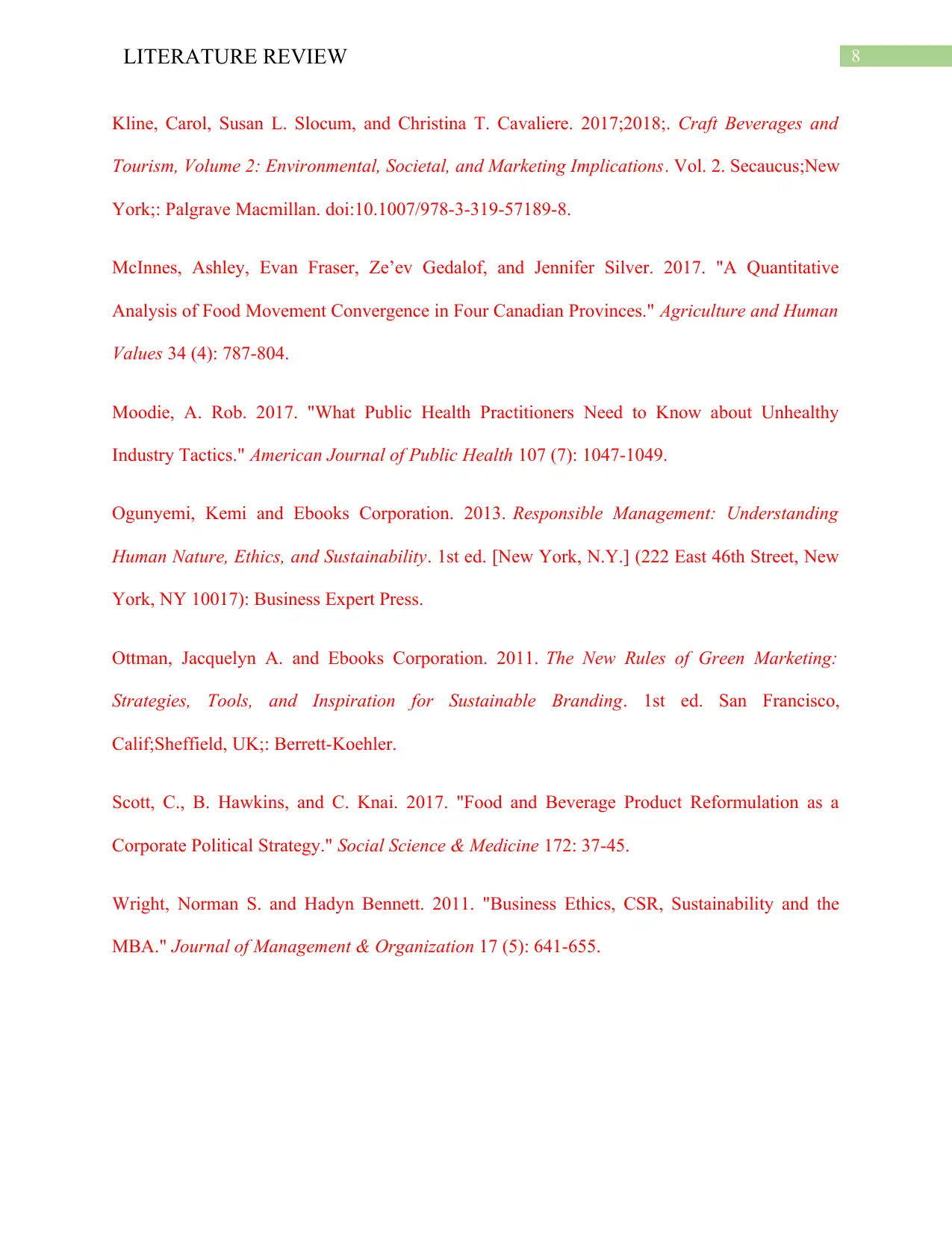
8LITERATURE REVIEW
Kline, Carol, Susan L. Slocum, and Christina T. Cavaliere. 2017;2018;. Craft Beverages and
Tourism, Volume 2: Environmental, Societal, and Marketing Implications. Vol. 2. Secaucus;New
York;: Palgrave Macmillan. doi:10.1007/978-3-319-57189-8.
McInnes, Ashley, Evan Fraser, Ze’ev Gedalof, and Jennifer Silver. 2017. "A Quantitative
Analysis of Food Movement Convergence in Four Canadian Provinces." Agriculture and Human
Values 34 (4): 787-804.
Moodie, A. Rob. 2017. "What Public Health Practitioners Need to Know about Unhealthy
Industry Tactics." American Journal of Public Health 107 (7): 1047-1049.
Ogunyemi, Kemi and Ebooks Corporation. 2013. Responsible Management: Understanding
Human Nature, Ethics, and Sustainability. 1st ed. [New York, N.Y.] (222 East 46th Street, New
York, NY 10017): Business Expert Press.
Ottman, Jacquelyn A. and Ebooks Corporation. 2011. The New Rules of Green Marketing:
Strategies, Tools, and Inspiration for Sustainable Branding. 1st ed. San Francisco,
Calif;Sheffield, UK;: Berrett-Koehler.
Scott, C., B. Hawkins, and C. Knai. 2017. "Food and Beverage Product Reformulation as a
Corporate Political Strategy." Social Science & Medicine 172: 37-45.
Wright, Norman S. and Hadyn Bennett. 2011. "Business Ethics, CSR, Sustainability and the
MBA." Journal of Management & Organization 17 (5): 641-655.
Kline, Carol, Susan L. Slocum, and Christina T. Cavaliere. 2017;2018;. Craft Beverages and
Tourism, Volume 2: Environmental, Societal, and Marketing Implications. Vol. 2. Secaucus;New
York;: Palgrave Macmillan. doi:10.1007/978-3-319-57189-8.
McInnes, Ashley, Evan Fraser, Ze’ev Gedalof, and Jennifer Silver. 2017. "A Quantitative
Analysis of Food Movement Convergence in Four Canadian Provinces." Agriculture and Human
Values 34 (4): 787-804.
Moodie, A. Rob. 2017. "What Public Health Practitioners Need to Know about Unhealthy
Industry Tactics." American Journal of Public Health 107 (7): 1047-1049.
Ogunyemi, Kemi and Ebooks Corporation. 2013. Responsible Management: Understanding
Human Nature, Ethics, and Sustainability. 1st ed. [New York, N.Y.] (222 East 46th Street, New
York, NY 10017): Business Expert Press.
Ottman, Jacquelyn A. and Ebooks Corporation. 2011. The New Rules of Green Marketing:
Strategies, Tools, and Inspiration for Sustainable Branding. 1st ed. San Francisco,
Calif;Sheffield, UK;: Berrett-Koehler.
Scott, C., B. Hawkins, and C. Knai. 2017. "Food and Beverage Product Reformulation as a
Corporate Political Strategy." Social Science & Medicine 172: 37-45.
Wright, Norman S. and Hadyn Bennett. 2011. "Business Ethics, CSR, Sustainability and the
MBA." Journal of Management & Organization 17 (5): 641-655.
⊘ This is a preview!⊘
Do you want full access?
Subscribe today to unlock all pages.

Trusted by 1+ million students worldwide
1 out of 9
Related Documents
Your All-in-One AI-Powered Toolkit for Academic Success.
+13062052269
info@desklib.com
Available 24*7 on WhatsApp / Email
![[object Object]](/_next/static/media/star-bottom.7253800d.svg)
Unlock your academic potential
Copyright © 2020–2026 A2Z Services. All Rights Reserved. Developed and managed by ZUCOL.





